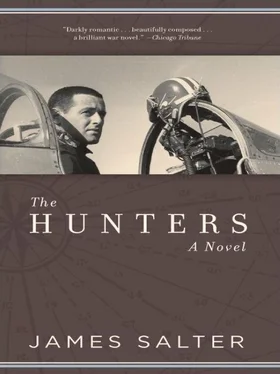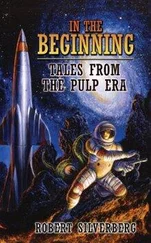He had walked in on a discussion of medals. A recommendation for Robey’s third Distinguished Flying Cross had just been returned from Fifth Air Force Headquarters.
“I don’t give a damn about the medal,” Robey said. “I’ve got it already. I’ve got plenty of them. It’s just the principle of the thing that smells.”
The new policy was that Air Medals were to be awarded for MIGs destroyed, instead of DFCs, as had been done in the past. Robey was incensed.
“Next, they’ll be giving merit badges,” he said.
He had the rejected recommendation crumpled in one hand, and he smoothed it out as he talked. He had to refer to it while he rewrote it with the squadron awards and decorations officer, who was a lieutenant in his flight. They were modifying it.
“You have to make it sound like something for the Medal of Honor just to get a lousy DFC out of them,” Robey said.
The citation had been matter of fact, reading simply “outmaneuvered the enemy aircraft with great skill.” Robey was dictating a more stirring amplification.
“Although under fire… from one element… of MIG-15 aircraft… at the time,” Robey said slowly as it was being copied down, “and in great… danger… better make that jeopardy; in great jeopardy… Captain Robey nevertheless pressed… a brilliant… timed attack… on another enemy element. Do you have that?”
“Wait a minute. Other… enemy… element. OK.”
“And succeeded… in destroying the… lead aircraft… with a long… accurate burst… at a high angle off… and at… extreme range.”
“All right. High… angle… off… extreme… range. There.”
Robey picked it up and read it through.
“All right,” he muttered. He could feel Cleve watching him. “That does it, eh?”
“It certainly does.”
“This is ridiculous, isn’t it?” Robey confided. “You’ll find out though. If you want to get anything out of those desk pilots at Fifth, you practically have to squeeze it out of them.”
“Is that what you’re doing?”
“They won’t turn this one down.”
“I wouldn’t know. Do you really think the DFC is enough, though?”
Robey’s expression firmed, but he passed it off lightly.
“Hell, no,” he said. “The way they make you fight to get one, there ought to be an extra medal to go along with it. For valor in the face of great administrative odds.”
“I’d say you’d have earned that one.”
“I wouldn’t turn it down. I can tell you that.”
“I don’t see how you very well could.”
Robey stiffened.
“I said I wouldn’t.”
Cleve got to his feet.
“I know,” he said. “I’ve been listening to you.”
“You’ve been talking mostly,” Robey said. “As far as I can see, Connell, that’s about all you do in that so-called flight of yours anyway. Why don’t you go back and give them a few thousand words on what you think instead of trying to tell me?”
“I haven’t told you what I think. I haven’t even begun to tell you.”
“Nobody asked you to,” Robey replied.
DeLeo and Daughters were in the room when Cleve entered. He lifted one side of the blanket that covered the table and reached beneath it for the shelf where the mission whiskey was kept. It was issued at so many ounces per man per mission, but they usually received it in the form of two or three bottles to the flight, as a monthly dividend. He withdrew one and set it on the table.
“Jim?” he asked Daughters.
“No thanks, Cleve. Not for me.”
He poured a drink for DeLeo without asking. His hand was shaking, and he moved so that he stood between them and the bottle. They mixed the whiskey with cold water from one of the canteens in the window box. Cleve sat back then and looked about him, at DeLeo, and at Daughters on his cot, sitting knees up, writing. He felt closer to them every day as their dimensions deepened for him, and at that moment especially he was sure he would have been lost without them. His so-called flight. Yes, they were that, he thought belligerently.
“Well, here’s to the heroes,” Cleve proposed. “Don’t ever know one if you can help it.”
“What does that mean?”
“I just spent a few pleasant minutes with Robey,” Cleve said.
“So?”
He told them what had happened. When he had finished, DeLeo spit at the floor.
“That’s for Robey,” he said. “Don’t let it bother you. If he’s a hero, I’m a genius.”
“He’s a fighter pilot; that’s something.”
“Sure. It means he’s a little crazy.”
“Stop being a clown for a minute. He represents this—I don’t know what to call it—craft. I use the word loosely. He’s accomplished what he’s supposed to do, he’s shot down airplanes. If it was two or three, it wouldn’t be so bad, but he’s got five. He’s not in the squadron any more, in a way. He belongs to all the fighter pilots, and if they’re not so numerous, to anybody that might consider them. So there he stands. They look at him and see us, what we try to be. Robey, with his chest full of medals…”
“The medals?” DeLeo said. “They don’t mean a thing. He could have a trunk full of medals and it wouldn’t mean anything.”
“Not to you, maybe, but you’re a primitive.”
“I’m a primitive? Just because I pick my nose?”
“That’s the least of it.”
“You’re insulting everybody tonight, aren’t you?”
Cleve smiled.
“Drink up,” he said. “Don’t be so sensitive. I only insult heroes.”
Daughters went back to his letter.
After a while, Pell came into the room. He had been at the club with Hunter and Pettibone, and those two had gone to the nightly movie. They went religiously, no matter what was playing. Pell never did; there were too many other things demanding his time. At the moment, he was interested in meeting the nurses in the hospital down in Yongdongpo, and he’d arranged to borrow a jeep to go there the following night. His reputation of always having had great success with women was something that required constant renewal. He was intrigued by the prospect of a conquest under difficult circumstances.
Pell poured himself a drink and sat down at the table. He stirred the liquid with his finger. He seemed to be unusually contemplative.
“I’m in a rut,” he complained. “Three missions, and I haven’t been in a fight yet.”
“You have a few left,” Cleve said.
“Ah, the damned war may end any time, though. Did you hear the news broadcasts tonight? They’ve worked their way down to disagreeing on just one little point at the truce talks.”
It was the first time that Cleve felt any shame himself at not caring whether it ended or not. There was a period of increasing pall. Pell had come, and the intimate mood had fled.
“Anybody feel like a few hands of gin?” Pell finally asked.
“How about it?”
“No thanks,” Cleve said.
DeLeo shook his head.
“What’s wrong?” Pell complained. “Doesn’t anybody around here play?”
There was a silence. Daughters folded the letter he had been writing and swung his legs to the floor.
“I’ll play a few hands with you, Pell,” he said.
He sat down at the table in his quiet way and watched as Pell picked up a deck of cards and began shuffling them with lean, expert fingers. He did not even seem to be aware of them whispering between his hands.
“What’ll we play for?” Daughters asked unexpectedly. He was not given to gambling.
Pell lit a cigar, pushed his hat back, and slumped down comfortably in the wooden chair. He shrugged.
“Just make it easy on yourself, Jim,” he said. “I don’t care.”
“How about half a cent a point?”
Читать дальше












